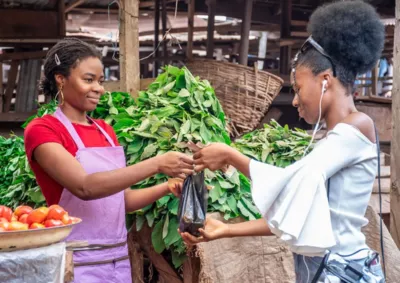NEWS & INSIGHTS: Global Public Health
In South Africa, the power of community-driven social impact services is on the rise. From education and healthcare to poverty alleviation and environmental conservation, these initiatives are empowering communities to tackle their own challenges head-on.This article delves into the diverse landscape of social impact services in South Africa, exploring the organizations, programs, and individuals driving positive change.
From grassroots initiatives addressing local needs to large-scale projects with national impact, the social sector in South Africa is vibrant and dynamic. Through innovative approaches, collaborative efforts, and a deep understanding of the community’s unique challenges, these organizations are making a tangible difference in people’s lives.
This exploration will uncover the various sectors and areas where social impact services are making significant strides. From youth development and women empowerment to sustainable agriculture and renewable energy, South Africa’s social impact ecosystem is multifaceted, addressing a wide range of pressing social issues.
Join us as we dive into this ever-evolving landscape, showcasing the incredible work being done and the impactful stories behind it. Discover how these initiatives are amplifying the voices of marginalized communities and fostering long-term, sustainable change throughout South Africa.
Importance of empowering communities in South Africa
South Africa, a country rich in diversity and cultural heritage, has a complex social fabric that requires tailored solutions to address its unique challenges. Empowering communities plays a crucial role in fostering sustainable development and addressing the systemic issues that have plagued the nation for decades.
Empowerment allows communities to take ownership of their own development, ensuring that solutions are locally relevant, culturally sensitive, and sustainable in the long run. By strengthening the voices of marginalized communities, social impact services enable individuals to actively participate in shaping their futures and harness their full potential.
Through collaborative efforts, community-driven initiatives build resilience, promote inclusivity, and drive positive change. They address a wide range of social issues, creating a ripple effect that extends beyond immediate beneficiaries, benefiting the entire society.
READ | Improving Public Health: How Public Health Surveys and Audits Benefit South Africa
Social impact services in South Africa
1. Education and Skills Development Programs
Education is a fundamental building block for societal progress, and social impact services in South Africa are making significant strides in this sector. From early childhood development programs to adult education initiatives, organizations are ensuring that access to quality education is not limited by socioeconomic factors.
One such organization is Education for All, which focuses on providing educational opportunities to children from disadvantaged backgrounds. Through mentorship programs, scholarships, and community engagement, they empower young learners with the tools and support they need to succeed.
Another notable program is Skills for Life, which offers vocational training and entrepreneurship programs to unemployed youth. By equipping them with valuable skills and knowledge, they enable these individuals to break the cycle of poverty and become self-sufficient contributors to society.
2. Healthcare and Wellness Initiatives
Access to quality healthcare is a fundamental human right, yet many communities in South Africa face numerous barriers in accessing essential services. Social impact services in the healthcare sector aim to bridge this gap and ensure that everyone has equal access to healthcare and wellness resources.
Healthcare for All is a prime example of an organization that is revolutionizing healthcare delivery in underserved communities. They deploy mobile clinics staffed with medical professionals to remote areas, providing primary healthcare services and health education. Through their efforts, they are improving health outcomes and reducing healthcare disparities.
Additionally, mental health awareness and support programs have gained momentum in recent years. Organizations like Mental Wellness Matters focus on providing counseling services, destigmatizing mental health issues, and promoting overall well-being within communities.
3. Environmental Conservation and Sustainability Projects
South Africa is a country blessed with diverse ecosystems and abundant natural resources. However, rapid industrialization and climate change pose significant threats to the environment. Social impact services in this sector are driving efforts to preserve biodiversity, promote sustainable practices, and mitigate the effects of climate change.
Green Guardians is an organization at the forefront of environmental conservation. They engage local communities in reforestation initiatives, waste management programs, and sustainable agriculture practices. By creating awareness and involving communities, they empower individuals to become stewards of the environment and protect their natural heritage.
Renewable energy projects are also gaining traction in South Africa. Solar Solutions for All is working towards providing affordable and clean energy solutions to off-grid communities. They install solar panels in rural areas, ensuring access to electricity while reducing reliance on fossil fuels.
4. Poverty Alleviation and Economic Empowerment Programs
Poverty remains a pervasive issue in South Africa, with high levels of inequality and unemployment. Social impact services are playing a crucial role in poverty alleviation and economic empowerment by providing opportunities for sustainable livelihoods.
Empowerment through Enterprise is an organization that focuses on microfinance and entrepreneurship training. They provide small loans to aspiring entrepreneurs and offer mentorship and business development support. By fostering entrepreneurship, they empower individuals to create their own economic opportunities and lift themselves out of poverty.
Another initiative, JobSkills, focuses on equipping individuals with the necessary skills for the job market. Through vocational training programs and job placement assistance, they bridge the gap between unemployment and meaningful employment, helping individuals secure stable incomes and improve their quality of life.
4. Supporting Marginalized Groups and Promoting Inclusivity
South Africa has a history marked by discrimination and exclusion, making it crucial to address the unique needs of marginalized groups. Social impact services are working diligently to promote inclusivity and create a society where everyone has equal opportunities.
Women Empowered is an organization dedicated to advancing gender equality and empowering women. They provide mentorship, leadership training, and financial literacy programs to women from disadvantaged backgrounds. By breaking down barriers and challenging societal norms, they empower women to become agents of change in their communities.
Similarly, organizations like Rainbow Pride focus on advocating for the rights and well-being of the LGBTQ+ community. Through awareness campaigns, support groups, and policy advocacy, they strive to create an inclusive society that respects and values diversity.
Education and skills development programs
While social impact services in South Africa have made significant progress, they face numerous challenges in their pursuit of sustainable change. Limited funding, bureaucratic hurdles, and a lack of awareness and support hinder the scalability and long-term impact of these initiatives.
However, there are also ample opportunities for growth and collaboration. Partnerships between government bodies, private sector entities, and civil society organizations can leverage resources, expertise, and networks to amplify the impact of social impact services. Additionally, adopting innovative approaches, harnessing technology, and promoting knowledge sharing can drive efficiency and effectiveness in the sector.
Healthcare and wellness initiatives
South Africa’s social impact services landscape is a testament to the resilience and determination of individuals and organizations working towards a more just, equitable, and sustainable future. By empowering communities, addressing pressing social issues, and promoting inclusivity, these initiatives are transforming lives and driving positive change.
To support and strengthen the social impact services sector in South Africa, it is essential for individuals, businesses, and policymakers to recognize the importance of investing in these initiatives. Increased funding, policy support, and collaboration can create an enabling environment for social impact services to thrive and make an even greater impact.
Together, let us celebrate and champion the incredible work being done in South Africa’s social impact ecosystem. By supporting community-driven initiatives and promoting sustainable development, we can contribute to a brighter future for all.
Environmental conservation and sustainability projects
South Africa faces numerous healthcare challenges, including limited access to quality healthcare services in many remote areas. However, social impact organizations are bridging this gap by providing innovative solutions. One such organization is Health4All, which operates mobile clinics that bring medical services directly to underserved communities. These clinics offer general check-ups, vaccinations, and essential medical treatments, ensuring that even the most marginalized individuals receive the care they deserve.
In addition to physical health, mental health services are also a critical focus for social impact organizations. Mind Matters is a nonprofit that offers counseling and therapy services to vulnerable populations, aiming to destigmatize mental health and provide support to those in need. Through their community-based approach, they have created safe spaces for individuals to seek help and find healing.
Despite these efforts, challenges remain, such as limited resources and funding. However, the impact of these healthcare initiatives cannot be understated. By prioritizing the well-being of communities, these organizations are contributing to a healthier and more resilient South Africa.
READ | The Importance of Investing in Public Health Training and Capacity Building
Poverty alleviation and economic empowerment programs
South Africa is known for its rich biodiversity and stunning landscapes, but the country also faces environmental challenges, including deforestation, habitat destruction, and carbon emissions. Social impact services are playing a crucial role in protecting and preserving the environment.
 The Green Initiative is one such organization that focuses on reforestation and habitat restoration. Through their tree planting projects, they aim to combat deforestation and restore ecosystems, creating a sustainable future for South Africa. By engaging local communities in these efforts, they foster a sense of ownership and responsibility for the environment.
The Green Initiative is one such organization that focuses on reforestation and habitat restoration. Through their tree planting projects, they aim to combat deforestation and restore ecosystems, creating a sustainable future for South Africa. By engaging local communities in these efforts, they foster a sense of ownership and responsibility for the environment.
Renewable energy initiatives are also gaining momentum in South Africa. Solar Solutions is a social enterprise that provides affordable solar energy solutions to rural communities. By harnessing the abundant sunlight in the region, they enable households to access clean and reliable electricity, reducing their reliance on fossil fuels and improving their quality of life.
While these environmental initiatives are making progress, there is still much work to be done. Increased awareness, policy support, and funding are essential to drive sustainable change and ensure a greener future for South Africa.
Supporting marginalized groups and promoting inclusivity
Poverty remains a significant challenge in South Africa, with a high percentage of the population living below the poverty line. Social impact organizations are actively working to address this issue by implementing poverty alleviation and economic empowerment programs.
One notable initiative is The Empowerment Project, which focuses on providing vocational training and entrepreneurship opportunities to unemployed individuals. By equipping them with the necessary skills and resources, this project empowers individuals to become self-sufficient and create their own sustainable businesses. Through mentorship and support, they are breaking the cycle of poverty and fostering economic growth from within communities.
Microfinance programs also play a vital role in empowering marginalized communities. The Small Loans Initiative provides small loans to aspiring entrepreneurs who lack access to traditional banking services. By offering financial support and business training, these programs enable individuals to start or expand their businesses, ultimately improving their livelihoods and contributing to local economic development.
Although poverty remains a complex issue, these programs are making a difference, one individual at a time. Through their targeted interventions, social impact organizations are working towards a more inclusive and equitable South Africa.
READ | Climate Policy & Advocacy: Steering Your Path Towards Sustainable Success
Challenges and opportunities in the social impact services landscape
South Africa is a diverse country with a history of discrimination and inequality. Social impact services are actively working to address these challenges by supporting marginalized groups and promoting inclusivity.
 Youth development initiatives, such as The Bright Futures Program, provide mentorship, skills training, and educational support to disadvantaged youth. By investing in their potential, these programs empower young individuals to overcome barriers and pursue successful futures. They aim to break the cycle of poverty and create opportunities for a brighter tomorrow.
Youth development initiatives, such as The Bright Futures Program, provide mentorship, skills training, and educational support to disadvantaged youth. By investing in their potential, these programs empower young individuals to overcome barriers and pursue successful futures. They aim to break the cycle of poverty and create opportunities for a brighter tomorrow.
Women empowerment organizations are also making significant strides in South Africa. The Women’s Empowerment Network focuses on providing resources, training, and advocacy for women to thrive in various sectors. By addressing gender-based violence, promoting financial independence, and advocating for equal opportunities, they contribute to a more equitable society.
While progress has been made, there is still much work to be done to ensure the full inclusion of marginalized groups. Social impact organizations continue to champion the rights and voices of these communities, working towards a more inclusive South Africa for all.
Conclusion and call to action for supporting social impact services in South Africa
While social impact services in South Africa are making significant strides, they also face various challenges and opportunities. Limited funding and resources often hinder the scalability and sustainability of initiatives. Additionally, navigating bureaucratic processes and policy barriers can be time-consuming and challenging for organizations.
However, these challenges also present opportunities for collaboration and innovation. By fostering partnerships between social impact organizations, government entities, and private sector stakeholders, the potential for collective impact increases. Additionally, leveraging technology and digital platforms can help organizations reach wider audiences and mobilize support for their causes.
Investing in the capacity-building of social impact organizations, providing training, and mentorship opportunities can also contribute to their long-term success. By strengthening their organizational structures and capabilities, these organizations can navigate challenges more effectively and deliver even greater impact.
Share This Post, Choose Your Platform!
In South Africa, the power of community-driven social impact services is on the rise. From education and healthcare to poverty alleviation and environmental conservation, these initiatives are empowering communities to tackle their own challenges head-on.This article delves into the diverse landscape of social impact services in South Africa, exploring the organizations, programs, and individuals driving positive change.
From grassroots initiatives addressing local needs to large-scale projects with national impact, the social sector in South Africa is vibrant and dynamic. Through innovative approaches, collaborative efforts, and a deep understanding of the community’s unique challenges, these organizations are making a tangible difference in people’s lives.
This exploration will uncover the various sectors and areas where social impact services are making significant strides. From youth development and women empowerment to sustainable agriculture and renewable energy, South Africa’s social impact ecosystem is multifaceted, addressing a wide range of pressing social issues.
Join us as we dive into this ever-evolving landscape, showcasing the incredible work being done and the impactful stories behind it. Discover how these initiatives are amplifying the voices of marginalized communities and fostering long-term, sustainable change throughout South Africa.
Importance of empowering communities in South Africa
South Africa, a country rich in diversity and cultural heritage, has a complex social fabric that requires tailored solutions to address its unique challenges. Empowering communities plays a crucial role in fostering sustainable development and addressing the systemic issues that have plagued the nation for decades.
Empowerment allows communities to take ownership of their own development, ensuring that solutions are locally relevant, culturally sensitive, and sustainable in the long run. By strengthening the voices of marginalized communities, social impact services enable individuals to actively participate in shaping their futures and harness their full potential.
Through collaborative efforts, community-driven initiatives build resilience, promote inclusivity, and drive positive change. They address a wide range of social issues, creating a ripple effect that extends beyond immediate beneficiaries, benefiting the entire society.
READ | Improving Public Health: How Public Health Surveys and Audits Benefit South Africa
Social impact services in South Africa
1. Education and Skills Development Programs
Education is a fundamental building block for societal progress, and social impact services in South Africa are making significant strides in this sector. From early childhood development programs to adult education initiatives, organizations are ensuring that access to quality education is not limited by socioeconomic factors.
One such organization is Education for All, which focuses on providing educational opportunities to children from disadvantaged backgrounds. Through mentorship programs, scholarships, and community engagement, they empower young learners with the tools and support they need to succeed.
Another notable program is Skills for Life, which offers vocational training and entrepreneurship programs to unemployed youth. By equipping them with valuable skills and knowledge, they enable these individuals to break the cycle of poverty and become self-sufficient contributors to society.
2. Healthcare and Wellness Initiatives
Access to quality healthcare is a fundamental human right, yet many communities in South Africa face numerous barriers in accessing essential services. Social impact services in the healthcare sector aim to bridge this gap and ensure that everyone has equal access to healthcare and wellness resources.
Healthcare for All is a prime example of an organization that is revolutionizing healthcare delivery in underserved communities. They deploy mobile clinics staffed with medical professionals to remote areas, providing primary healthcare services and health education. Through their efforts, they are improving health outcomes and reducing healthcare disparities.
Additionally, mental health awareness and support programs have gained momentum in recent years. Organizations like Mental Wellness Matters focus on providing counseling services, destigmatizing mental health issues, and promoting overall well-being within communities.
3. Environmental Conservation and Sustainability Projects
South Africa is a country blessed with diverse ecosystems and abundant natural resources. However, rapid industrialization and climate change pose significant threats to the environment. Social impact services in this sector are driving efforts to preserve biodiversity, promote sustainable practices, and mitigate the effects of climate change.
Green Guardians is an organization at the forefront of environmental conservation. They engage local communities in reforestation initiatives, waste management programs, and sustainable agriculture practices. By creating awareness and involving communities, they empower individuals to become stewards of the environment and protect their natural heritage.
Renewable energy projects are also gaining traction in South Africa. Solar Solutions for All is working towards providing affordable and clean energy solutions to off-grid communities. They install solar panels in rural areas, ensuring access to electricity while reducing reliance on fossil fuels.
4. Poverty Alleviation and Economic Empowerment Programs
Poverty remains a pervasive issue in South Africa, with high levels of inequality and unemployment. Social impact services are playing a crucial role in poverty alleviation and economic empowerment by providing opportunities for sustainable livelihoods.
Empowerment through Enterprise is an organization that focuses on microfinance and entrepreneurship training. They provide small loans to aspiring entrepreneurs and offer mentorship and business development support. By fostering entrepreneurship, they empower individuals to create their own economic opportunities and lift themselves out of poverty.
Another initiative, JobSkills, focuses on equipping individuals with the necessary skills for the job market. Through vocational training programs and job placement assistance, they bridge the gap between unemployment and meaningful employment, helping individuals secure stable incomes and improve their quality of life.
4. Supporting Marginalized Groups and Promoting Inclusivity
South Africa has a history marked by discrimination and exclusion, making it crucial to address the unique needs of marginalized groups. Social impact services are working diligently to promote inclusivity and create a society where everyone has equal opportunities.
Women Empowered is an organization dedicated to advancing gender equality and empowering women. They provide mentorship, leadership training, and financial literacy programs to women from disadvantaged backgrounds. By breaking down barriers and challenging societal norms, they empower women to become agents of change in their communities.
Similarly, organizations like Rainbow Pride focus on advocating for the rights and well-being of the LGBTQ+ community. Through awareness campaigns, support groups, and policy advocacy, they strive to create an inclusive society that respects and values diversity.
Education and skills development programs
While social impact services in South Africa have made significant progress, they face numerous challenges in their pursuit of sustainable change. Limited funding, bureaucratic hurdles, and a lack of awareness and support hinder the scalability and long-term impact of these initiatives.
However, there are also ample opportunities for growth and collaboration. Partnerships between government bodies, private sector entities, and civil society organizations can leverage resources, expertise, and networks to amplify the impact of social impact services. Additionally, adopting innovative approaches, harnessing technology, and promoting knowledge sharing can drive efficiency and effectiveness in the sector.
Healthcare and wellness initiatives
South Africa’s social impact services landscape is a testament to the resilience and determination of individuals and organizations working towards a more just, equitable, and sustainable future. By empowering communities, addressing pressing social issues, and promoting inclusivity, these initiatives are transforming lives and driving positive change.
To support and strengthen the social impact services sector in South Africa, it is essential for individuals, businesses, and policymakers to recognize the importance of investing in these initiatives. Increased funding, policy support, and collaboration can create an enabling environment for social impact services to thrive and make an even greater impact.
Together, let us celebrate and champion the incredible work being done in South Africa’s social impact ecosystem. By supporting community-driven initiatives and promoting sustainable development, we can contribute to a brighter future for all.
Environmental conservation and sustainability projects
South Africa faces numerous healthcare challenges, including limited access to quality healthcare services in many remote areas. However, social impact organizations are bridging this gap by providing innovative solutions. One such organization is Health4All, which operates mobile clinics that bring medical services directly to underserved communities. These clinics offer general check-ups, vaccinations, and essential medical treatments, ensuring that even the most marginalized individuals receive the care they deserve.
In addition to physical health, mental health services are also a critical focus for social impact organizations. Mind Matters is a nonprofit that offers counseling and therapy services to vulnerable populations, aiming to destigmatize mental health and provide support to those in need. Through their community-based approach, they have created safe spaces for individuals to seek help and find healing.
Despite these efforts, challenges remain, such as limited resources and funding. However, the impact of these healthcare initiatives cannot be understated. By prioritizing the well-being of communities, these organizations are contributing to a healthier and more resilient South Africa.
READ | The Importance of Investing in Public Health Training and Capacity Building
Poverty alleviation and economic empowerment programs
South Africa is known for its rich biodiversity and stunning landscapes, but the country also faces environmental challenges, including deforestation, habitat destruction, and carbon emissions. Social impact services are playing a crucial role in protecting and preserving the environment.
 The Green Initiative is one such organization that focuses on reforestation and habitat restoration. Through their tree planting projects, they aim to combat deforestation and restore ecosystems, creating a sustainable future for South Africa. By engaging local communities in these efforts, they foster a sense of ownership and responsibility for the environment.
The Green Initiative is one such organization that focuses on reforestation and habitat restoration. Through their tree planting projects, they aim to combat deforestation and restore ecosystems, creating a sustainable future for South Africa. By engaging local communities in these efforts, they foster a sense of ownership and responsibility for the environment.
Renewable energy initiatives are also gaining momentum in South Africa. Solar Solutions is a social enterprise that provides affordable solar energy solutions to rural communities. By harnessing the abundant sunlight in the region, they enable households to access clean and reliable electricity, reducing their reliance on fossil fuels and improving their quality of life.
While these environmental initiatives are making progress, there is still much work to be done. Increased awareness, policy support, and funding are essential to drive sustainable change and ensure a greener future for South Africa.
Supporting marginalized groups and promoting inclusivity
Poverty remains a significant challenge in South Africa, with a high percentage of the population living below the poverty line. Social impact organizations are actively working to address this issue by implementing poverty alleviation and economic empowerment programs.
One notable initiative is The Empowerment Project, which focuses on providing vocational training and entrepreneurship opportunities to unemployed individuals. By equipping them with the necessary skills and resources, this project empowers individuals to become self-sufficient and create their own sustainable businesses. Through mentorship and support, they are breaking the cycle of poverty and fostering economic growth from within communities.
Microfinance programs also play a vital role in empowering marginalized communities. The Small Loans Initiative provides small loans to aspiring entrepreneurs who lack access to traditional banking services. By offering financial support and business training, these programs enable individuals to start or expand their businesses, ultimately improving their livelihoods and contributing to local economic development.
Although poverty remains a complex issue, these programs are making a difference, one individual at a time. Through their targeted interventions, social impact organizations are working towards a more inclusive and equitable South Africa.
READ | Climate Policy & Advocacy: Steering Your Path Towards Sustainable Success
Challenges and opportunities in the social impact services landscape
South Africa is a diverse country with a history of discrimination and inequality. Social impact services are actively working to address these challenges by supporting marginalized groups and promoting inclusivity.
 Youth development initiatives, such as The Bright Futures Program, provide mentorship, skills training, and educational support to disadvantaged youth. By investing in their potential, these programs empower young individuals to overcome barriers and pursue successful futures. They aim to break the cycle of poverty and create opportunities for a brighter tomorrow.
Youth development initiatives, such as The Bright Futures Program, provide mentorship, skills training, and educational support to disadvantaged youth. By investing in their potential, these programs empower young individuals to overcome barriers and pursue successful futures. They aim to break the cycle of poverty and create opportunities for a brighter tomorrow.
Women empowerment organizations are also making significant strides in South Africa. The Women’s Empowerment Network focuses on providing resources, training, and advocacy for women to thrive in various sectors. By addressing gender-based violence, promoting financial independence, and advocating for equal opportunities, they contribute to a more equitable society.
While progress has been made, there is still much work to be done to ensure the full inclusion of marginalized groups. Social impact organizations continue to champion the rights and voices of these communities, working towards a more inclusive South Africa for all.
Conclusion and call to action for supporting social impact services in South Africa
While social impact services in South Africa are making significant strides, they also face various challenges and opportunities. Limited funding and resources often hinder the scalability and sustainability of initiatives. Additionally, navigating bureaucratic processes and policy barriers can be time-consuming and challenging for organizations.
However, these challenges also present opportunities for collaboration and innovation. By fostering partnerships between social impact organizations, government entities, and private sector stakeholders, the potential for collective impact increases. Additionally, leveraging technology and digital platforms can help organizations reach wider audiences and mobilize support for their causes.
Investing in the capacity-building of social impact organizations, providing training, and mentorship opportunities can also contribute to their long-term success. By strengthening their organizational structures and capabilities, these organizations can navigate challenges more effectively and deliver even greater impact.




